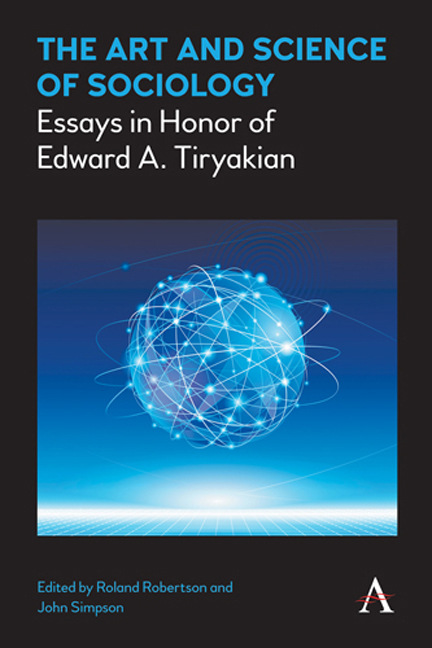Book contents
- Frontmatter
- Contents
- List of Figures and Tables
- List of Contributors
- Acknowledgments
- Introduction
- Chapter 1 The Dynamo and the Diplomat: Tiryakian's Role in Preserving Sorokin's Reputation
- Chapter 2 Edward Tiryakian and Modernization Theory: A Very Special Relationship
- Chapter 3 Developmental Path (Entwicklungsform): A Neglected Weberian Concept and Its Usefulness in the Civilizational Analysis of Islam
- Chapter 4 The Existential Sociology of Edward Tiryakian: Toward an Integrated Paradigm
- Chapter 5 Comparative Reflections on Sociology and Conservatism: The Contributions of Edward A. Tiryakian
- Chapter 6 Contemporary Changes in the Processes of Social Differentiation: Toward an Analytical Version of the Theory
- Chapter 7 Considerations on Global Studies
- Chapter 8 Honoring Edward Tiryakian as a Metasociologist: A Metaconceptual Analysis of Prosumption and Related Concepts
- Chapter 9 Dangerous Nouns of Process: Differentiation, Rationalization, Modernization
- Chapter 10 Modernization as Social Becoming: Ten Theses on Modernization
- Chapter 11 Religion and Evolution
- Chapter 12 The “Axial Age” vs. Weber's Comparative Sociology of the World Religions
- Edward A. Tiryakian's Publications
- Index
Chapter 8 - Honoring Edward Tiryakian as a Metasociologist: A Metaconceptual Analysis of Prosumption and Related Concepts
Published online by Cambridge University Press: 22 July 2017
- Frontmatter
- Contents
- List of Figures and Tables
- List of Contributors
- Acknowledgments
- Introduction
- Chapter 1 The Dynamo and the Diplomat: Tiryakian's Role in Preserving Sorokin's Reputation
- Chapter 2 Edward Tiryakian and Modernization Theory: A Very Special Relationship
- Chapter 3 Developmental Path (Entwicklungsform): A Neglected Weberian Concept and Its Usefulness in the Civilizational Analysis of Islam
- Chapter 4 The Existential Sociology of Edward Tiryakian: Toward an Integrated Paradigm
- Chapter 5 Comparative Reflections on Sociology and Conservatism: The Contributions of Edward A. Tiryakian
- Chapter 6 Contemporary Changes in the Processes of Social Differentiation: Toward an Analytical Version of the Theory
- Chapter 7 Considerations on Global Studies
- Chapter 8 Honoring Edward Tiryakian as a Metasociologist: A Metaconceptual Analysis of Prosumption and Related Concepts
- Chapter 9 Dangerous Nouns of Process: Differentiation, Rationalization, Modernization
- Chapter 10 Modernization as Social Becoming: Ten Theses on Modernization
- Chapter 11 Religion and Evolution
- Chapter 12 The “Axial Age” vs. Weber's Comparative Sociology of the World Religions
- Edward A. Tiryakian's Publications
- Index
Summary
Ed Tiryakian may not have thought of himself as a meta-analyst, or of what he was doing as meta-analysis, but he, and a very large proportion of his work, fit under those headings. At times, his meta-analytical orientation was quite clear in work on such topics as the “metacultures” of modernity (Tiryakian 1996); the presuppositions of macrosociology (Tiryakian 1992); and the sociology of sociology (Tiryakian 1971). Much more often he did this kind of analysis more implicitly in, for example, his work on sociology in general (Tiryakian 2001), on a wide range of sociological theorists (especially Emile Durkheim), sociological schools (Tiryakian 1986, 1979) and theoretical integration and synthesis (Tiryakian 1990).
While I have not done a great deal of meta-analytic work in recent years, I will return to it in this essay as a way of paying tribute to Ed. This essay will also serve as a way of extending in some new directions my recent work on what might be thought of, in Ed's terms, as a neo-modern concept: prosumption. This concept is meant to subsume the clearly modern concepts of production and consumption. I begin by outlining my thinking on presumption. In the process, I will be doing a kind of meta-analysis—metaconceptual analysis—that I and others have not previously differentiated from other, better-known forms of meta-analysis (especially, metatheory, metamethods, metadata analysis). Tiryakian (1981), himself, has done such metaconceptual work—for example, in his essay on Weber's “iron cage” metaphor.
That is not to say there is any shortage of work in sociology and many other fields devoted explicitly to such conceptual analysis (e.g., Bulmer 1979). Bestknown, at least at one time and in certain circles, was some of the early work of Raymond Boudon (1968), which dealt, in part, with explication de texte. This is defined as “the identification of the current uses of a term in different traditions and the specification of its meaning based on its common dimensions” (Hamlin, forthcoming). While work on explication de texte was not done under the heading of meta-analysis, that is clearly what was being undertaken in such work. More generally, meta-analysis and, in particular, metaconceptual analysis, have been inherent aspects of sociology since its inception.
- Type
- Chapter
- Information
- The Art and Science of SociologyEssays in Honor of Edward A. Tiryakian, pp. 131 - 148Publisher: Anthem PressPrint publication year: 2016



